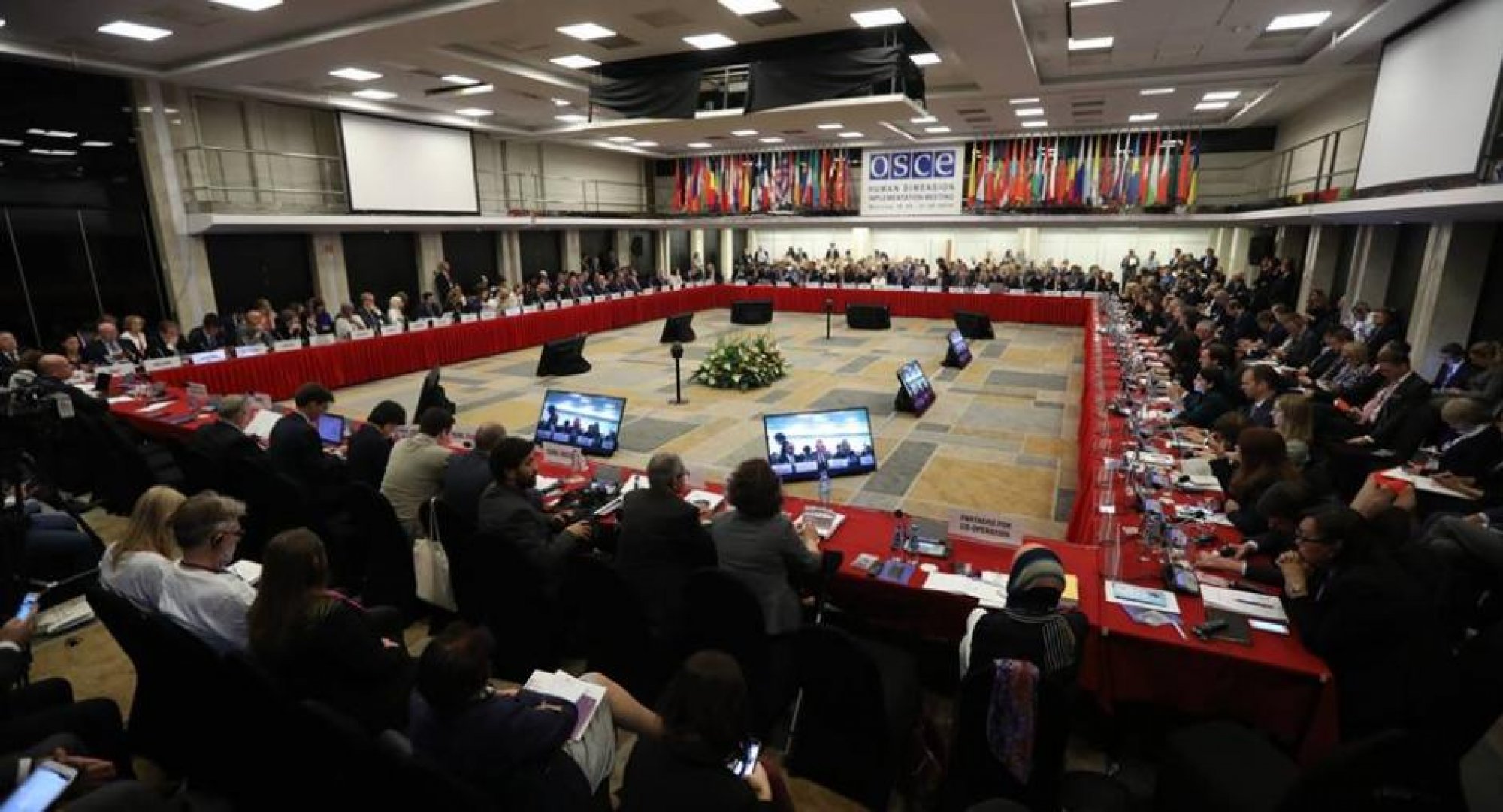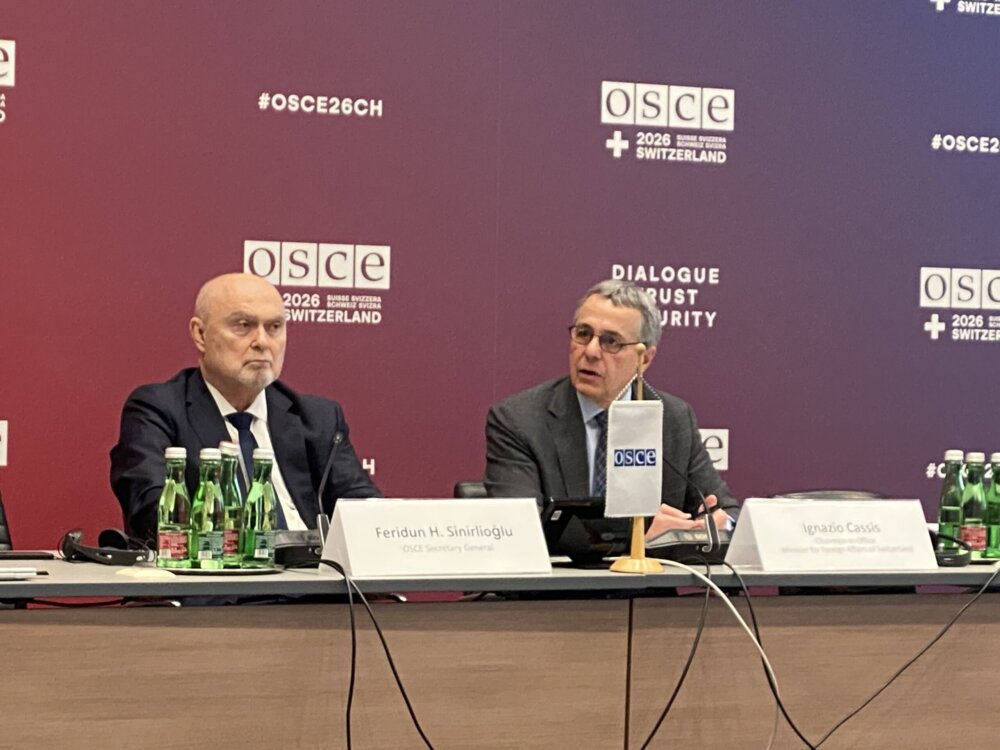OSCE/Piotr Dziubak

How to rescue the OSCE human dimension
For the second year in a row, the OSCE’s Human Dimension Implementation Meeting (HDIM) is not taking place. Last year, the annual flagship meeting on the human dimension—OSCE participating States’ commitment to human rights and functioning democratic institutions—had to be cancelled due to Covid-19 restrictions. ODIHR in cooperation with the 2020 Albanian Chairmanship prepared a series of other online human rights events instead. This year, negotiations on the agenda were blocked because of just one country, Russia. (The meetings generally require a consensus to take place.)
This move dealt a major blow to the OSCE human dimension. These meetings had been held without interruption since 1993. But now public and critical discussions of States’ human rights performance have been silenced.
The HDIM, which usually takes place over the course of ten days, reviews the human dimension commitments of OSCE participating States. The event involves both, representatives of governments and civil society, making HDIM not only the largest human rights conference in Europe, but a unique forum for addressing human rights issues.
Three points have to be agreed on by the entire Permanent Council each year for HDIM to take place: its dates (traditionally it takes place at the end of September or early October), its agenda, including the order of agenda points, and the subjects for three special thematic days of the conference.
In recent years, these decisions have been held up until the very last moment by different participating States. The Turkish government, for example, started objecting to NGOs attending they labeled as supporters of ‘terrorism’. In 2018, this led the then Italian OSCE Chairmanship to go ahead with HDIM despite only two of the three decisions having been agreed on. In response, Turkey did not attend the conference. Kyrgyzstan and Tajikistan have also objected to the frequent appearance of opposition groups.
Russia has fiercely negotiated the details of the agenda and the choice of the subjects for the special days, but previously has always joined the consensus. This year frantic discussions continued throughout the summer, keeping delegates from their summer leave. The discussions ended on 30 August—the last day on which the conference venue could be confirmed—because of Russia’s continued opposition.
Statements given in the OSCE Permanent Council by the EU (30 July), the Swedish Chairpersonship (20 August), Russia and other states on the final day give insight into the discussion. The subject of ‘democratic elections’ for one of the special days was apparently a no-go for Russia and a suitable replacement subject could not be found. Other points of discussion were about whether the meeting should take place in a hybrid format or in-person, and about Russia’s demand that the threat of ‘neo-Nazism’ be given a more prominent place on the agenda.
Apart from HDIM, Russia currently appears to be trying to block OSCE activities in a variety of other areas. For the first time, Russian elections have not been observed by ODIHR because of the unacceptably strict conditions authorities placed on the size of the monitoring mission.
In addition, the OSCE’s budget was only adopted in August this year as Russia announced parts of ODIHR’s election monitoring budget would be more closely scrutinized. Russia also rejected the extension of the mandate of the OSCE observers on the Russian-Ukrainian border in the Donbass region.
If this tendency persists, the OSCE may soon become critically dysfunctional. Multilateralism cannot exist on the basis of excessive pick-and-choose policies by participating States.
ODIHR was created 30 years ago as the main body in charge of promoting and monitoring the human dimension. Even celebrating that anniversary has become controversial. Normally it would have taken place as part of HDIM. Now it will take place as a separate conference on 14-15 October in Warsaw. The Civic Solidarity Platform, the main NGO network that engages with OSCE human dimension processes and that normally has a high profile at HDIM, will hold its own event the day before.
In light of these developments, ways have to be found to rescue the OSCE human dimension. One way would be to make much more frequent use of the so-called Moscow Mechanism, which does not require consensus to be set in motion.
The Moscow Mechanism was created 30 years ago at the Moscow Conference on the Human Dimension. It enables ten or more OSCE participating States to initiate “ad hoc missions of independent experts to assist in the resolution of a specific human dimension problem”. The Moscow Mechanism is one of the few OSCE procedures that do not require consensus and was insisted on at that time by the Soviet/Russian delegation.
Recent invocations of the Moscow Mechanism have been met with rejection by the States that harbor the problems in question. Still the reports issued, most recently in November 2020 on Belarus, have been highly authoritative and are a stepping stone for further measures by the international community. They also lead to a lot of public debate.
If human dimension problems cannot be raised at HDIM, I would suggest returning to the 1991 alternative of the Moscow Mechanism and greatly expand its use. This will help to rescue the OSCE human dimension. There are sufficient ‘specific human dimension problems’ that can be dealt with under the mechanism. To start with, think of a renewed application to the crisis in Belarus. Or to the lack of international observation of the elections in Russia. Or even to a revival of the 2003 application of the mechanism with respect to Turkmenistan.
A major question at the same time is whether the survival of the human dimension should not also have consequences for States outside the former Soviet space. Serious human dimension issues can also be encountered in other parts of the OSCE region, and lack of follow-up on OSCE commitments and of specific ODIHR recommendations can be observed there as well. After all, criticism of States ‘east of Vienna’ can only be credible if the necessary energy and resources are devoted to human rights matters in the rest of the OSCE region as well.



Comments
* Your email address will not be published